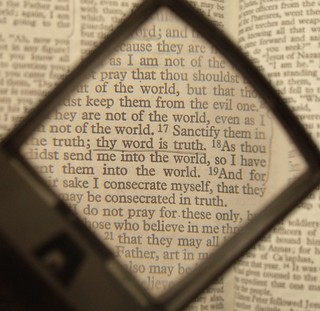 Photo by Charles Clegg (CC)So there are many, many steps involved in writing a novel (I know, thank you, Captain Obvious). And one of the things you'll find in all those checklists is--what is the story's theme? It's even a step in the Save the Cat beat sheet.
Photo by Charles Clegg (CC)So there are many, many steps involved in writing a novel (I know, thank you, Captain Obvious). And one of the things you'll find in all those checklists is--what is the story's theme? It's even a step in the Save the Cat beat sheet.
Blake Snyder goes so far as to say that in a movie (novel in our case), the theme is often stated outright. It's usually in some offhanded comment in the first 5% of the movie, typically said by someone other than the main character. So something like "all work and no play makes Jack a dull boy", "crime doesn't pay", etc. Though, hopefully yours is said in a less cliche way.
It's what the story is going to be about, underneath the plot points. And it makes a story richer, more layered. And even if you didn't consciously put a theme in your story, there's probably one there.
Now, on a more meta level, it's also said that most writers tend to write to the same universal theme over and over again. This does NOT mean writing the same story over and over again. What I talked about above is the novel theme, this is the author theme. For some reason, we're drawn to certain types of stories and we tend to come up with ideas that speak to our universal theme.
For instance, one of the themes Stephen King uses a lot is: "The greatest evil that people do is victimization of the weak by the strong." (Quoted from Books Worth Reading. Check out the post for King's other common themes.)
And let me tell you, I've given a lot of thought to theme and have even done the Save the Cat thing and had the theme stated plainly in the book. If you look at the last line of the prologue in MELT INTO YOU, that's the theme of the story: "Because sometimes doing the wrong thing was the only thing that felt right."
However, as much as I tried to work on novel theme, I could never really figure out my author theme. I wasn't convinced I had one. I mean, love conquers all is kind of the theme of all romance novels but that's too vague. And then the other day I was struggling with my current book and emailing with my buddy, Jamie Wesley. And she said, "Just remember your theme. Your books are all about healing and self-acceptance."
And I stared at her email and wanted to jump through the computer and hug her. All this time trying to figure out my theme, and she nailed it like it was the most obvious statement in the world. And she was absolutely, 100% right. That is what every book I've ever written is about. For those of you who have read my books, you'll see it plain as day if you think about the stories.
So why does this matter? Who cares if you can pinpoint it or not?
Well, it matters because when you're struggling with an idea, circling up with your theme can help clarify where you want to go with the story. That doesn't mean you ALWAYS have to write to that theme, but knowing what kinds of stories inspire you can give you a starting point.
And specific story theme can provide the same thing--clarity. What is this story really about? If it really is about "crime doesn't pay", you better not reward criminal behavior in the book.
Also, don't stress if the story theme doesn't come to you immediately. Sometimes, especially for pantsers, you don't know what the story is about until you finish it. You can always go back in revisions and strengthen the theme throughout.
And if all else fails, get brilliant writer friends like I have who can bonk you over the head and tell you "Duh, your books are about THIS." : )
So what do you think of theme? Is it something you consciously try to weave into your story? Do you think you have a universal author theme? What is it?